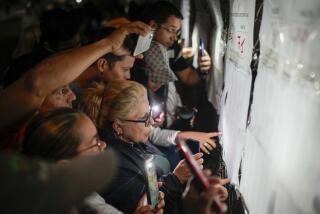Greece voters face tough choices at polls
ATHENS — Last month, Greeks went to the polls in anger. On Sunday, they return in fear.
In an election widely viewed as a referendum on the country’s membership in the Eurozone, voters here are choosing between the guaranteed pain of continued austerity and the uncertain danger of trying to break free of those brutal cuts.
The first option, as protest parties such as the far-left Syriza group argue, would mire Greece in deep recession for years, if not decades. The second, as the conservative New Democracy party warns, would mean the “kiss of death” that forces Greece’s European peers to push the country out of the shared currency.
Polls taken in recent weeks show the two sides neck and neck, with New Democracy possibly ahead by a whisker. But more than a third of the country’s 9.5 million voters remain undecided.
“It’s like the country is suffering from bipolar mood swings,” said a leading Greek pollster, speaking on condition of anonymity because of a ban imposed two weeks before voting. “One day is entirely different from the next, and it’s bound to continue like this down to the wire.”
New Democracy appears to have consolidated a marginal lead over the upstart Syriza, increasing its chances of emerging as the biggest vote-getter once again.
But it wasn’t able to capitalize on that lead in last month’s balloting, and the failure to form a government piled a political crisis on top of an acute five-year economic recession. The uncertain result ripped the social fabric of the country, leaving the near-insolvent nation gripped by instability and further spooking international investors and markets.
European creditors have since warned that any failure by Athens to follow through on the harsh terms of a multibillion-dollar bailout could imperil the country’s membership in the Eurozone, the group of nations that share the euro currency.
The economic contagion continued to threaten other European countries Thursday.Spain’sborrowing rate briefly hit the 7% mark that many analysts describe as unsustainable over the long term for the government to finance its operations. When the borrowing rates stayed at such levels in Greece, Portugal and Ireland, those countries were forced to apply for international bailouts.
Concern about Spain, which has escalated since Madrid accepted the need for a bank bailout of up to $125 billion last weekend, has also affected Italy, which saw its interest rates rise ominously at a sale of government debt Thursday.
Central bankers around the world appeared to be ready to take measures to mute any effect Greece’s elections may have on financial markets. In Britain, Chancellor of the Exchequer George Osborne and Bank of England Gov. Mervyn King are preparing programs to increase the flow of credit.
There was also heavy speculation on Wall Street that the Federal Reserve, European Central Bank and others might be planning coordinated efforts to help bulletproof the global economy.
New Democracy has campaigned for Sunday’s elections on a platform built mostly on fear, citing threats by the country’s creditors to pull the plug on billions of dollars in emergency aid if the radical Syriza wins and follows through on its pledge to rip up the bailout agreement. One New Democracy television ad shows a teacher in a classroom reciting the names of countries that use the euro and a pupil asking why Greece is no longer on the list.
To form a coalition government, New Democracy would probably have to join forces with its traditional political nemesis, the Socialist party, or PASOK. But PASOK is teetering on the verge of an all-out electoral collapse: Its backing has sunk from a whopping 44% when it rose to power in late 2009 to a projected 9.5% Sunday.
Alexis Tsipras, Syriza’s brash young leader, rallied voters Thursday at a relatively somber election finale to “terrorize the terrorists.” But he also sought to appeal to moderate voters who want to keep the country anchored in the euro, despite his party’s pledges to rip up the bailout agreement.
“No to the memorandum of bankruptcy,” he told supporters. “Yes to the euro with a national recovery plan that will rebuild the economy and protect the people from bankruptcy.”
No matter who ends up on top after the vote, the new Greek government will inherit an increasingly dysfunctional state that might not be capable of carrying out the demands of its European partners, which call for even deeper budget cuts.
Greece’s overall fiscal situation is rapidly deteriorating, in a year when it was supposed to be returning to the international markets to raise cash. European Union and International Monetary Fund inspectors have warned of serious slippages in the financial targets Athens should have met in May and June. Under the country’s bailout program, Greece has to reduce its budget deficit to 7.3% of GDP this year from 9.3% in 2011, and cut its primary deficit, which excludes interest payments, to 1% from 2.4%.
Any shade of a pro-bailout government to emerge from the elections will have to implement a fresh round of budget cuts to go on receiving the international loans that are keeping this country afloat.
But as Sunday nears, voters such as Vassilis Koutouvalos, a retired civil servant, are wondering “whether there is any point to forming a grand bailout coalition if the task [they face] will be so impossible to carry out.”
A bailout coalition “would be doomed from its inception,” said Koutouvalos, sitting at a traditional coffee shop in tree-lined central Athens.
His friend Telemachos Hatzoglou had a different take: “It’s like putting a Band-Aid on gangrene. But when that’s all you have, that’s all you can do, aside from wait and pray.”
Carassava is a special correspondent. Times staff writer Henry Chu in London contributed to this report.
More to Read
Sign up for Essential California
The most important California stories and recommendations in your inbox every morning.
You may occasionally receive promotional content from the Los Angeles Times.









